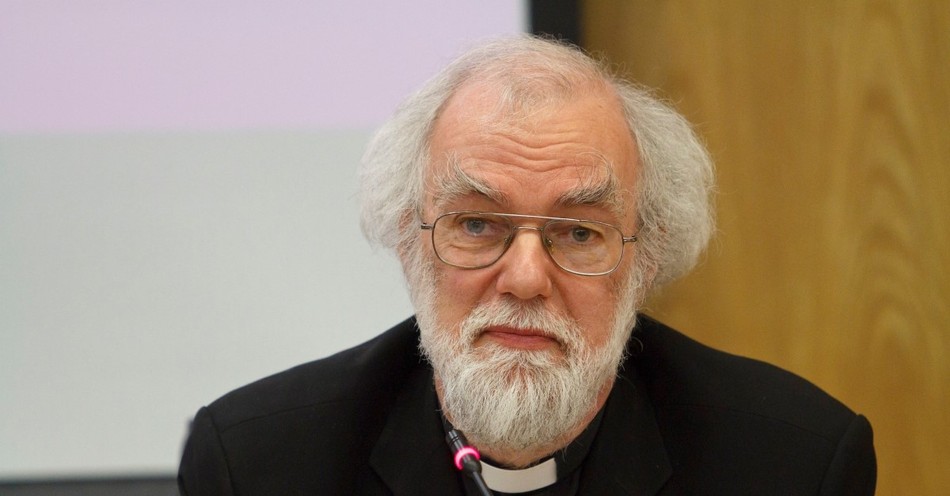Rowan Williams is best-known in the United Kingdom for his work as a priest. However, even outside the UK, he is known for working with the poor, broken, and destitute, debating atheists such as Richard Dawkins, and writing numerous books of poetry, literary criticism, and theology. He has also given numerous speeches worldwide on the correlation between faith and art, and knows over 10 languages.
So how did Williams become the man who has inspired so many people around the world?
How Did Rowan Williams Grow Up?
Williams was born on June 14, 1950, in Swansea, Wales. He was raised in the Christian tradition by his parents, Aneurin and Nancy Willliams. More specifically, his parents converted from Presbyterianism to Anglicanism when he was a small child. Due to the shift, Williams grew up loving the liturgy, the Eucharist, and The Book of Common Prayer.
Williams was educated at Dynevor School in Swansea, Wales, before he went to study theology at Christ’s College, Cambridge. In 1975, Williams completed his doctorate of philosophy at Oxford, writing his thesis on theologian Vladimir Lossky. He taught courses on literature and theology at Cambridge before becoming ordained as a deacon in 1977.
What Makes Rowan Williams a Famous Priest?
Williams had various positions as a chaplain and teacher during the 1980s, including receiving a Doctor of Divinity in 1989 from Oxford University. He was ordained as a bishop in Monmouth, Wales, in 1991 and then became the Archbishop of Wales in 1999. He then reached new levels of public exposure in 2002 when he was ordained as the 104th Archbishop of Canterbury at St. Paul’s Cathedral in London.
William served as Archbishop for ten years, where he participated in various efforts to promote Christianity to secular audiences and unity within the church.
He stepped down as Archbishop in 2012 and returned to academia. He served as the 35th master of Magdalene College, Cambridge, from 2013 to 2020, and taught Christian thought at the University of Cambridge in 2017.
What Makes Rowan Williams’ Theology Unique?
Williams’ theology is very Anglo-Catholic. The Ango-Catholic movement began in the nineteenth century when theologians such as John Henry Newman, John Keeble, and E.B. Pusey brought about a revival of Catholic teachings within the Church of England. Anglo-Catholic teachings emphasized the importance of sacraments, icons, vestments, and prayers to the saints while rejecting the Pope’s authority as the Vicar of Christ on earth and the Roman Catholic Church’s claims to infallibility. As such, Williams has been very interested in what connects those two traditions, which has aided his ecumenical approach to Christianity.
Williams is also known for his historic approach to theology. He has studied the early church fathers, a wide variety of theologians, and writers such as Fyodor Dostoevsky, J.R.R. Tolkien, and C.S. Lewis. Lewis has particularly provided a model for Williams’ ecumenical approach to theology. Although Williams is a devout member of the Church of England, he has described himself as a “Mere Christian,” as defined by Lewis in Mere Christianity—a label that emphasizes common connections with other Christians across denominations.
Williams sought to unify the church using his vocations as a writer, teacher, and Archbishop of Canterbury. Williams found the cultural wars between conservatives and liberals, and Protestants and Catholics, to be extremely damaging to people outside of the church. Williams exhorted Christians to remember Christ’s command to love God with all our heart, mind, and soul and our neighbor as ourselves. The Greeks define this type of love as agape—the highest form of love, never self-seeking and desiring the ultimate good for the beloved.
During a lecture at Lincoln Cathedral in 2010, Williams expressed his desire for the diverse body of Christ to be known by how we live out agape:
“And so in our age and in the age that lies ahead, the faith we as Christians proclaim will need to be not a glib system but the possibility of dependable relationship. We need to point quite simply to the God who does not let go, to the Christ who does not run away – and (here’s the rub) we need ourselves to be dependable people.” – “Faith, hope and charity in tomorrow’s world”
This approach, allowed Williams to reach a wide audience of Christians and non-Christians. In Scripture, we are taught by Christ that the world will know Christians by their love for God and human beings. Though different political and theological issues are important, the most important aspect of a believer’s life is living out one’s faith by grace. Williams has modeled this approach well, inspiring many Christians across the world to be known by their love.
What Kind of Work Does Rowan Williams Write?
Williams has written numerous books, encompassing poetry, theology, plays, literary criticism, and devotionals. Writing in many different genres allows Williams to reach a wide readership and glorify Christ with his writing gift.
One of Williams’ most well-known works is his book The Lion’s World, inspired by Lewis’ The Chronicles of Narnia. In the book, Williams’ main argument is to approach Lewis’ seven-book series not as a way of explaining the Christian theology found in them, but to enjoy the stories on an imaginative and emotional level. Whether readers interpret the books as Christian allegories or fairy tales, the theology is not the only level to the story. The stories can be enjoyed as what they are, great stories, as well as for their morals.
What Classics Books Has Williams Translated?
As well as being a prolific poetry and theology writer, Williams has translated different classic works of literature. In 2017, Williams compiled a book of poetry called Christian Imagination from Poetry to Polity: Some Anglican Voices From Temple to Herbert by different Anglican thinkers such as George Herbert, Henry Vaughan, and others.
Williams’ work of translation, published in 2019, was a book of Welsh poems called The Book of Taliesin, attributed to the sixth-century Welsh Bard Taliesin about war, Welsh national identity, the beauty of nature, myth, and folklore.
In 2022, Williams translated a book of poetry called A Century of Poetry: A Hundred Poems for Searching the Heart, was published. The hundred poems contained in the book explore themes of doubt and faith, suffering and joy, love, and the gift of life as being a sacrament.
What Makes Rowan Williams a Resource on Literature?
Williams is a voracious reader, prolific author, and an admirer of great writers. Williams’ wide range of reading has allowed him to reach people of various cultures and worldviews with the agape love of Christ. These different writers, who share the same worldview as Williams and others who do not, all explore the complexity of being human in the twenty-first century.
Fyodor Dostoevsky was a nineteenth-century Russian author. His most famous works include The Brothers Karamazov, The Idiot, and Crime and Punishment. Dostoevsky’s work explores the existential reality of suffering and how, through suffering, one experiences hope and redemption. This honesty about the reality of suffering, growth, and joy people experience is explored pungently in the Psalms and other places in Scripture.
Williams’ book of literary criticism, Dostoevsky: Language, Faith, and Fiction, published in 2011, explores how each of the brothers, Ivan, Dimitri, and Alyosha, represent different worldview perspectives and shows how faith is a virtue rather than a delusion. According to Williams, through this great work of classic literature that reads like a parable, Dostoevsky is attempting to be honest about the suffering and evil in the world, the big life questions that everyone asks at some point, while yet also affirming that a good and loving God is active in the world.
In the book, Williams also explores theological themes such as justice, atonement, and hope in Dostoevsky’s novels Crime and Punishment, The Idiot, and Devils. Many scholars and readers have interpreted Dostoevsky’s work differently, but Williams argues that it is important not to separate Dostoevsky’s Christian convictions from his writings. In this context, Dostoevsky is not simply a Christian writer but a writer whose Christian faith is embedded in all his works.
In 2013, Williams spoke to the T. S. Eliot Society on why Eliot’s poetry is still important today. He details how Eliot’s poems, such as “The Waste Land” and “Four Quartets,” the poet wrote about about the Christian virtue of hope amid the darkness of WWI and WWII.
In a public conversation with writer Ian Wilson held in 2009 in Wales, Williams talked about how the goodness of God could be found in Christian writers such as Jane Austen and writers of different worldviews, even avowedly secular writers like Philip Pullman. Although Pullman’s fantasy series was written as an anti-Narnia fantasy series, Pullman explores honest questions about suffering and redemption found in Scripture.
How Has Rowan Williams Modeled Christian Activism?
Williams has been a strong advocate in fighting climate change and advocating social justice. As Christians, we are taught that God’s good creation, though fallen, does matter and that people are created in the Imago Dei—in the image of God. In this context, any form of desecration of land, racism, or discrimination is a sin, a violation of agape.
The greatest display of this agape love is Christ on the cross dying for all of humanity because he loves us, not to appease a wrathful deity. Through Christ’s death and resurrection, humanity has hope in the present. Because of this hope, we are called to be the hands and feet of Christ. In this context, Williams has encouraged every believer to do good in their local communities, whether their day job is being a teacher, writer, musician, grocery clerk, bookseller, librarian, social worker, or doctor.
Photo Credit: Wikimedia Commmons
Justin Wiggins is an author who works and lives in the primitive, majestic, beautiful mountains of North Carolina. He graduated with his Bachelor's in English Literature, with a focus on C.S. Lewis studies, from Montreat College in May 2018. His first book was Surprised by Agape, published by Grant Hudson of Clarendon House Publications. His second book, Surprised By Myth, was co-written with Grant Hudson and published in 2021. Many of his recent books (Marty & Irene, Tír na nÓg, Celtic Twilight, Celtic Song, Ragnarok, Celtic Dawn) are published by Steve Cawte of Impspired.
Wiggins has also had poems and other short pieces published by Clarendon House Publications, Sehnsucht: The C.S. Lewis Journal, and Sweetycat Press. Justin has a great zeal for life, work, community, writing, literature, art, pubs, bookstores, coffee shops, and for England, Scotland, and Ireland.
This article is part of our People of Christianity catalog that features the stories, meaning, and significance of well-known people from the Bible and history. Here are some of the most popular articles for knowing important figures in Christianity:
How Did the Apostle Paul Die?
Who are the Nicolaitans in Revelation?
Who Was Deborah in the Bible?
Who Was Moses in the Bible?
King Solomon's Story in the Bible
Who Was Lot's Wife in the Bible?
Who Was Jezebel in the Bible?
Who Was the Prodigal Son?









